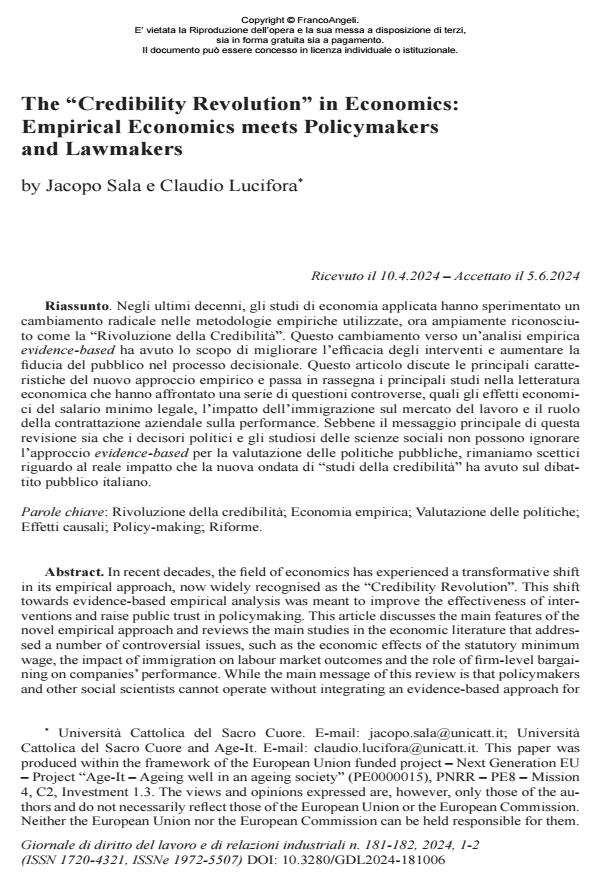The “Credibility Revolution” in Economics: Empirical Economics meets Policymakers and Lawmakers
Titolo Rivista GIORNALE DI DIRITTO DEL LAVORO E DI RELAZIONI INDUSTRIALI
Autori/Curatori Jacopo Sala , Claudio Lucifora
Anno di pubblicazione 2024 Fascicolo 2024/181-182
Lingua Inglese Numero pagine 15 P. 113-127 Dimensione file 682 KB
DOI 10.3280/GDL2024-181006
Il DOI è il codice a barre della proprietà intellettuale: per saperne di più
clicca qui
Qui sotto puoi vedere in anteprima la prima pagina di questo articolo.
Se questo articolo ti interessa, lo puoi acquistare (e scaricare in formato pdf) seguendo le facili indicazioni per acquistare il download credit. Acquista Download Credits per scaricare questo Articolo in formato PDF

FrancoAngeli è membro della Publishers International Linking Association, Inc (PILA), associazione indipendente e non profit per facilitare (attraverso i servizi tecnologici implementati da CrossRef.org) l’accesso degli studiosi ai contenuti digitali nelle pubblicazioni professionali e scientifiche.
Negli ultimi decenni, gli studi di economia applicata hanno sperimentato un cambiamento radicale nelle metodologie empiriche utilizzate, ora ampiamente riconosciuto come la “Rivoluzione della Credibilità”. Questo cambiamento verso un’analisi empirica evidence-based ha avuto lo scopo di migliorare l’efficacia degli interventi e aumentare la fiducia del pubblico nel processo decisionale. Questo articolo discute le principali caratt ristiche del nuovo approccio empirico e passa in rassegna i principali studi nella letteratura economica che hanno affrontato una serie di questioni controverse, quali gli effetti economi- ci del salario minimo legale, l’impatto dell’immigrazione sul mercato del lavoro e il ruolo della contrattazione aziendale sulla performance. Sebbene il messaggio principale di questa revisione sia che i decisori politici e gli studiosi delle scienze sociali non possono ignorare l’approccio evidence-based per la valutazione delle politiche pubbliche, rimaniamo scettici riguardo al reale impatto che la nuova ondata di “studi della credibilità” ha avuto sul dibattito pubblico italiano. .
Parole chiave:Rivoluzione della credibilità; Economia empirica; Valutazione delle politiche; Effetti causali; Policy-making; Riforme
Jacopo Sala , Claudio Lucifora, The “Credibility Revolution” in Economics: Empirical Economics meets Policymakers and Lawmakers in "GIORNALE DI DIRITTO DEL LAVORO E DI RELAZIONI INDUSTRIALI " 181-182/2024, pp 113-127, DOI: 10.3280/GDL2024-181006